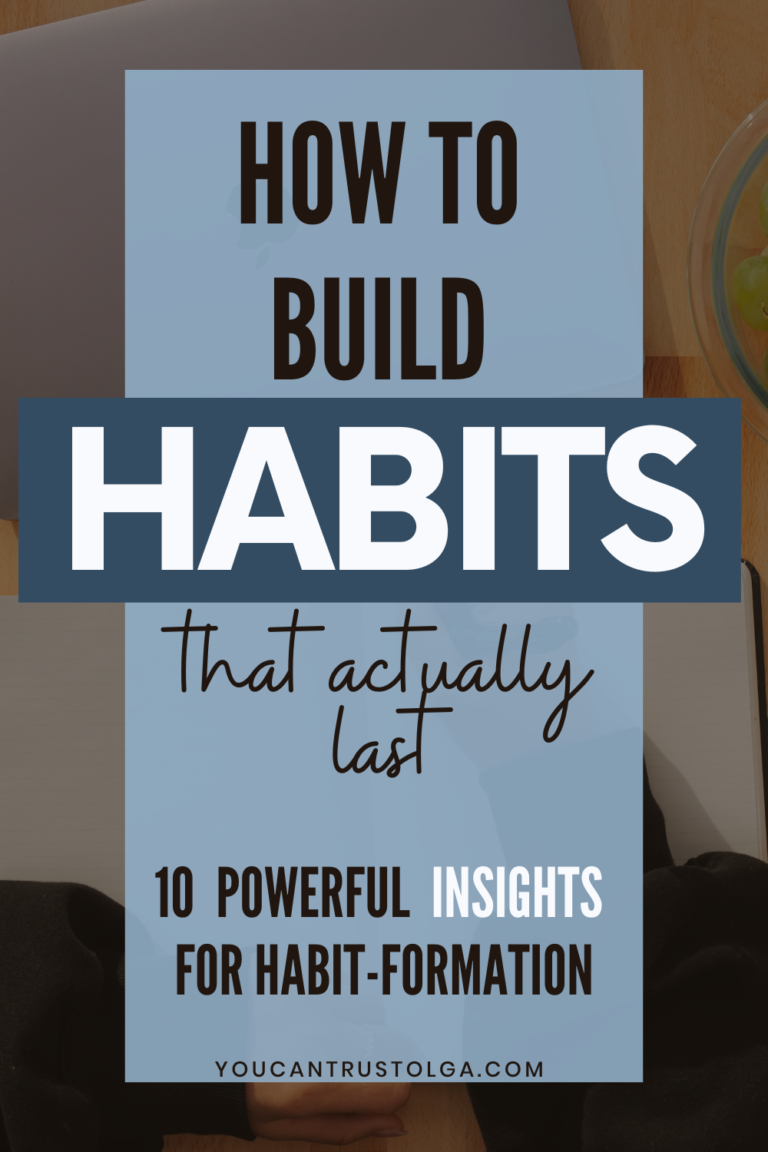Have you ever wondered why you struggle to follow through on your intentions? Why do you prioritize certain things as important but never seem to find the time for them?
If you’ve experienced this frustrating cycle of failed habits, then this blog post is for you.
I discovered that creating habits that stick goes beyond relying on willpower. In fact, willpower alone is not enough. Understanding the psychology behind habit formation is the real game changer.
In this comprehensive guide, I invite you to explore how to form habits that will last a lifetime. Let’s delve into the secrets of building enduring habits together.

We are the habits we owe
Habits play a vital role in shaping our lives, more than we often comprehend. They are not just something we possess or acquire, they compose the very essence of who we are.
Our habits form the building blocks of our identity, defining us through the consistent routines we engage in. In other words – we ARE the habits.
What does it mean?
That means that who you are today is the result of the habits you once chose to adopt.
Your eating and sleeping patterns, your level of activity and vitality, the quality of your social life, your mindset, productivity, and even your mood are all reflections of your habitual behavior.
Wow, that’s a tough realization…
On the bright side, this promises us hope because it is within our control to use it to our advantage.
Let’s take a look at the next example.
Consider the most common habit we share: brushing our teeth. Can you imagine life without it? It’s unlikely. We CAN technically go without it, only the consequences would be the deteriorating state of our teeth.
Here’s the realization: earlier in life you chose to develop the habit of brushing your teeth daily. Now, thanks to this habit, you have healthy, beautiful teeth instead of a mouthful of decay.
The question is – What else can you do?
Where do we get our habits from?
“Laziness is nothing more than the habit of resting before you get tired.” Jules Renard
Most of our habits are default. Meaning they were acquired unconsciously, sporadically, and without questioning during our early life upbringing. Little by little silently they shaped our lives and soon became second nature to us.
Now as adults we hardly pay attention to actions like putting our shoes on in the same order every morning, unplugging the coffee machine after each use, or changing into comfortable clothes when we return home from work.
All because these actions are automated and enrooted in our daily actions and thoughts through repetition and mental conditioning.
While some of these habits are small and insignificant, the majority play a pivotal role in shaping our futures. This majority requires serious revision if we want to get the control back.
In the end, the choice is yours: Are you to drift aimlessly or give your life an intention?
RELATED READING
Different types of habits
There are mainly 4 categories of habits: Physical, Mental, Social, and Productivity.
PHYSICAL HABITS
Habits of the physical realm have a significant impact on our overall well-being. They concern our bodies and can either boost our energy and improve our physical well-being or lower our energy levels and damage our physical health.
Examples of great physical habits can be:
- going for a jog every morning
- consuming a balanced diet with plenty of fruits and vegetables
- establishing a consistent sleep schedule
- flossing the teeth
MENTAL HABITS
Mental habits, on the other hand, are those that govern our thoughts and cognitive processes. They play a significant role in maintaining mental clarity and emotional well-being. They can either enhance or diminish our mental resilience and the ability to maintain a positive outlook on life.
Among good mental habits are:
- practicing mindfulness
- reading regularly
- engaging in positive self-talk
- meditating
SOCIAL HABITS
Social habits are crucial for building and nurturing relationships. They reflect the quality of our relationships with other people. They can foster strong and fulfilling social connections or impair our ability to socialize effectively.
Examples of recommended social habits include:
- actively listening when others speak
- expressing gratitude
- making time for meaningful connections with loved ones
- putting your phone away when you are with someone
PRODUCTIVITY HABITS
Productivity habits play a crucial role in maximizing our time and accomplishing our goals. These habits are geared towards personal development and growth, allowing us to become the best versions of ourselves. The habits we choose to adopt can either elevate our lives or lead us to a stagnant existence.
Effective productivity habits might involve
- creating a daily to-do list
- prioritizing tasks
- minimizing distractions
- taking breaks
How long does it take to form a new habit?
The process of forming a habit can differ in the effort required.
While some people can develop certain habits in as little as 18 days, for others, it might take as long as six months.
Big discrepancy, I know.
This shows that how quickly habits stick can vary based on personal differences and how complicated the habit is.
Factors such as motivation, consistency, and the nature of the behavior all play a role in shaping the timeline for habit formation.
So, if you find that it’s taking a bit longer to establish a new habit, don’t be discouraged – it’s a unique journey for everyone.

Mechanism behind habit formation
Habit formation has two sides: physiological and psychological.
Physiologically, it’s about our nervous system. When we repeat an action, it creates a clear nerve connection, like building a pathway.
This smoothens the flow of nerve energy, from sensing to moving. With repetition, the connection gets stronger, leading to an organized nervous system – that’s what we call a habit or learning.
Psychologically, habits are seen as acquired tendencies. When we learn or experience something, repeating it makes it stick.
This ability to remember and repeat strengthens the habit. In simpler terms, habits are like patterns our nerves follow or learned behaviors that become second nature to us.
How to form habits
1. Eliminating bad habits
One thing you have to understand is that habit formation happens mostly by replacing old bad habits with new, healthier ones.
To give an example, imagine you have a habit of indulging in something sweet after every meal.
Now, here’s the thing: by consciously choosing to stop doing that, you’re actually doing something beneficial for your health. Can you call avoiding unnecessary sugar in your diet a healthy habit? I think so.
And what about those evenings when you unwind by mindlessly binging on TV shows or endlessly scrolling through social media?
When you know for a fact that there are other, more fulfilling activities you can do instead.
How about changing these habitual patterns as well?
2. Habits Inventory
Start by making an inventory of all the habits you have. Bring them to the forefront of our mind by asking introspective questions:
What are my habits?
Which of them are holding me back from becoming the person I truly want to be?
These questions require a certain level of self-awareness and reflection and are worth being pondered. Use journaling if it helps to make a list of all the possible habits you can find.
Going through the list will give you a better perspective of where are you standing and what is you want to change.
To make a change, you need to become actively aware not just of what you’re doing, but also of the impulses that lead to those behaviors.
In other words, you need to bring to the surface of your awareness hidden habits.
3. Identifying Hidden Habits
There are two common types of habits: conscious habits and hidden habits.
Identifying conscious habits is relatively easy since they are habits you’re aware of.
Examples include smoking after a meal, daily workouts, evening runs, or waking up to an alarm.
On the other hand, hidden habits make up the majority of our habits and are challenging to identify. We might be completely unaware of these habits as they seamlessly blend into our everyday routine and operate on autopilot in our brains.
It is often, someone else who points them out because they’re usually revealed by external factors.
Hidden habits are crucial because they play a major role in our decision-making, lifestyle, and overall well-being.
4. Make It Easy
If we finally abandon the idea of using just willpower and agree that doing anything by force will not do, what do we have left?
The answer is – strategy, based on the understanding of human psychology and habit formation.
One such realization is that we are only capable of maintaining the behavior that is easy for us to do.
Meaning, that habit can occur only if we are capable of doing it.
It may not be your favorite activity, but you can certainly dedicate some time to doing it, as it is achievable without much physical or mental effort.
That is why, whatever your goal is, START SMALL.
Instead of running 2 miles every morning, shoot for a consistent 30-minute walk before breakfast.
Can you do that? I bet you can.
5. Avoid Temptations
People who demonstrate excellent self-discipline are not fundamentally different from those facing challenges. The key difference lies in how they organize their lives, making it unnecessary to constantly rely on heroic willpower and self-control.
In simple words, you want to minimize the exposure to tempting situations, so you spend less time in circumstances that test your self-discipline.
For example, you would not leave a jar of your favorite chocolates on the table if you decide to go on a diet.
Or you would disable phone notifications if you are known to be easily distracted by them.
6. Create New Triggers
Setting triggers is a powerful strategy for forming new habits, as they act as cues that prompt the desired behavior.
These triggers serve as reminders and help integrate the habit into your daily routine.
For example, if you want to cultivate a habit of daily gratitude journaling, you might set the trigger of doing it right after your morning coffee. The act of sipping your coffee becomes the cue that signals it’s time to write down things you’re thankful for.
Another example could be tying your new habit to an existing routine, such as doing a quick stretching routine right after brushing your teeth in the morning. By associating the new habit with an established behavior, you’re more likely to remember and seamlessly incorporate it into your day.

7. Be aware of your mental state
When you’re tired or facing intense negative emotions, you are more likely to fall back into familiar old behaviors.
Our emotions, feelings, and moods carry numerous deeply ingrained patterns, many of which operate at an unconscious level.
This is the toughest part because when we’re tired, sad, or bored, our decisions can easily be influenced in the wrong direction.
Ideally, you’d aim to let your emotional state serve as a reminder for your new positive habit.
Only it can be tricky.
The challenge is that to connect a positive habit to an emotion, you have to be fully aware of that emotion in the moment.
It means being both emotional and aware simultaneously, which can be tough. But it is not impossible.
All you need to do is to stop yourself at this critical moment and take a pause.
PAUSING TECHNIQUE
Stop what you’re doing, sit comfortably, and close your eyes. Don’t worry, it will only take a minute or two. Can you spare that?
Take a couple of deep intentional breaths, exhaling any worries or thoughts about the next steps, and release any tension in your body.
Then, for the next few cycles observe your normal breathing without any forcing.
Now, pay attention to what you’re feeling during this pause. Are there specific sensations in your body? Do you sense restlessness or anxiety as you step away from your thoughts? Is there a temptation to go back to your task?
Can you just accept whatever’s happening inside you for this moment?
8. Link the wanted behavior with something pleasant
Our brains are wired to steer away from anything that feels unpleasant or carries a negative vibe.
If we attach negative feelings to a habit, our brain might want to avoid it because, well, who wants to do something that doesn’t feel good, right?
That is why when it comes to forming habits, it’s better to make friends with our own minds.
Instead of making our habits feel like chores we can spice them up with some positivity.
For instance, working out becomes more fun when there’s music playing that you love. Or finding delicious food recipes will help if you are trying to eat more vegetables.

A great way to make your habit-building more fun is to use technology. There are tons of habit-tracking apps on the market these days. Many of those apps are not just user-friendly but also designed in the format of role-playing games. What can be more entertaining?
The key is to turn our habits into something our brains actually want to do. And if we really try, we can have fun with almost anything; we just need to be more open-minded and creative.
Once your habits are pleasant, they become less of a task and more of a choice you look forward to.
9. encourage yourself daily
“People often say that motivation doesn't last. Well, neither does bathing – that's why we recommend it daily.”
Motivation isn’t a one-time achievement like a college diploma that you obtain and retain indefinitely. Instead, it’s more like a flame that requires continuous kindling. To keep that motivational fire burning, daily efforts of SELF-ENCOURAGEMENT become essential.
When you're feeling low, try "The Miracle Question" technique. Ask yourself, "If a miracle happened tonight and I have achieved my goals, how would tomorrow be different?"
This helps you see all the good things your habit can bring, and it’s like a boost of energy to keep you going.
Additionally, surround yourself with reminders of what awaits you when you achieve your goal. Whether it’s a visual board, a written affirmation, or a supportive message, these reminders serve as perfect daily encouragements.
10. Practice self-compassion
Making a new habit stick can be a challenging task because let’s be honest, from time to time we will slip off.
In these moments being harsh on ourselves seems logical and just, but it is not productive at all, I promise you. It will only increase your chance of getting discouraged and giving up for good.
How is that helpful?
Instead, giving yourself forgiveness and grace may sound counterintuitive, yet, it is exactly what has to be done.
I strongly support the idea of practicing self-compassion, as I firmly believe that it holds the key to finding the answers we seek.
By acknowledging that failure is a natural part of any journey and by celebrating our good intentions and accomplishments, we can make greater progress than if we constantly criticize ourselves for every minor setback.






